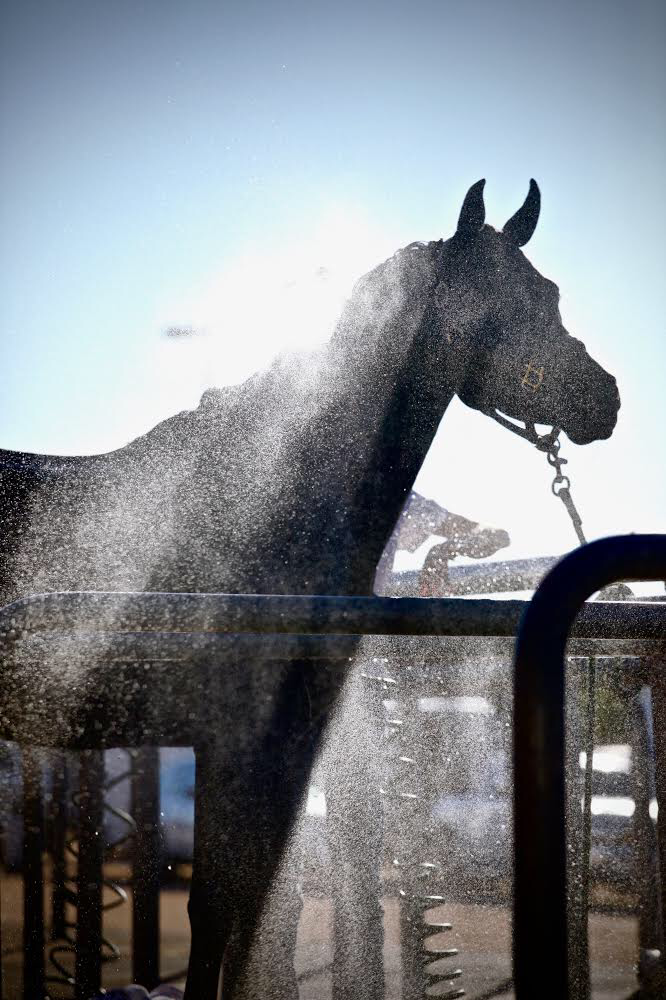The Arizona summer heat is upon as once again. As we get into full swing of the rising temperatures, it’s important to keep the health of both our horses and ourselves in mind! Now a little heat never stopped a true cowgirl or cowboy, but we need to keep ourselves strong and we owe it to our horses to always put their welfare first and foremost as we ride through the summer months.
Humans:
The number one thing I can say is, “Drink lots of water!” If you think you have, drink more just in case. Staying hydrated is super important, especially here where it’s so dry and we sweat so much. Trust me, getting dehydrated is NOT how you want to spend your barn time. Besides for obvious health reasons, you also want to avoid getting dehydrated because it interferes with your body’s ability to function at its best, and we want to make the most out of every moment with our horses.
Also, sunscreen is your friend! Getting burned to a crisp a) isn’t fun and b) will make you regret it later on in life. Keeping a bottle of sunscreen with your barn stuff isn’t a bad idea.
The heat can also just plain exhaust you and use up more energy than you think. Consider bringing a healthy snack to keep you going if you’re going to be out working horses for a while! Keeping your energy and electrolytes up will keep you sharp and on your game, even during those brutal summer work sessions.
Maintaining common sense is also handy… if you can avoid riding in the hottest part of the day, choose the early mornings or evenings when the heat isn’t so intense. However, sometimes it can’t be avoided, so be smart. If you’re lucky enough to have access to a covered arena, use it! Stay in the shade if you have the option and make sure you don’t overwork your fitness level… if you’re getting back into shape for riding or maybe a beginner who hasn’t done a lot yet, don’t overdo it! (This goes for your horse as well!!)
Horses:
As far as prevention of any heat related issues for your horse, the same common-sense thing goes along here. Be smart. Don’t overwork your horse beyond his/her capabilities, stay in the shade during the peak afternoon temps if you have the option, and make sure to properly cool down your horse at the end of the workout!
Concerning your horse’s health, I can’t say it enough, know your horse! You have to know what your horse’s “normal” is so you can tell when something might be wrong. I went over your horse’s vital signs and how to take them in a previous post, but I’ll mention the basic numbers again.
- An adult horse’s resting heart-rate is approximately 30-40 bpm (beats per minute) and 70-100 bpm for a foal.
- Normal temperature for a healthy, adult horse at rest should be 99.5-101.5 *F. It should be 100-101.5 for a foal.
- The respiration rate for a healthy, adult horse is around 12-18 breaths per minute and 24-60 breaths per minute for a foal.
When we work our horses in the heat, their temperatures are obviously going to rise and their respiration and heartrate are going to increase just like us. That’s normal. Nothing to be concerned of there. What we need to be aware of is if our horses are getting TOO hot and not recovering like they should. The key here is that your horse should be able to begin to cool himself back down during a few minutes of rest. Horse’s get heat stroke when the cooling systems in their body can’t get rid of excess heat. You should know the signs of heat stroke in your horse so you can catch a problem if it starts to develop.
- Elevated Heart Rate – a pulse of more than 80 beats per minute that doesn’t slow down after two minutes of rest
- Elevated Temperature – a rectal temperature of 103°F or higher
- Elevated Respiratory Rate – between 40 to 50 breaths per minute, shallow breathing, and breathing that remains elevated after two minutes of rest
- Increased or Absence of Sweating – full-body sweating or, worse, if your horse stops sweating entirely
- Lethargy – signs of depression, disinterest in food, stumbling or collapsing
If your horse is showing signs of overheating, definitely stop activity, hose your horse with cool water, offer him water, and keep him in the shade (under a fan if possible). Heat stroke can be a serious condition, so don’t ignore it!
Keep in mind, a horse who is healthy and fit will be far less likely to have a problem then one who has other health conditions such as a sickness or parasites. Don’t let fear of the heat stop you from working your horse! But I do encourage you to learn the signs so you can be a knowledgeable and responsible horse owner if a problem ever were to arise.
Don’t let the heat keep you away from the barn! If you prepare, you’ll be all set to keep your horse and yourself in tip top condition while you work and ride through the summer months. Remember: Be smart, stay cool, and drink lots of water!
See you around the barn!
-Rebekah Bukowski

